
In May 2018, 13 small farms and agricultural nonprofits across the US received grants totaling $47,534 for sustainable farm projects. Over the summer, they applied their funding to projects ranging from the installation of solar panels and bat houses to transitioning to no-till agriculture and planting heirloom fruit trees.
Our 2018 grantees worked to overcome some immense challenges, from shipment delays to flooding and droughts. While work in their communities is far from over, here’s an exciting look at the results from the first season of their sustainability projects.
Sustainability Projects
47 Daisies
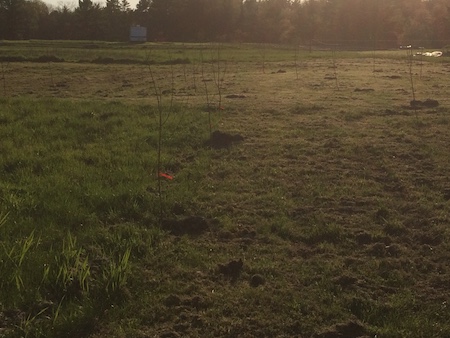 A 12-acre nonprofit in Vassalboro, ME, 47 Daisies grows vegetables, fruit, and mushrooms, which they distribute through retail outlets and the 47 Daisies Food Access Programs for low-income individuals, seniors, and children. They received a $2,500 grant to plant a variety of fruit trees and add pollinator plantings, bat houses, and bluebird houses to their farm.
A 12-acre nonprofit in Vassalboro, ME, 47 Daisies grows vegetables, fruit, and mushrooms, which they distribute through retail outlets and the 47 Daisies Food Access Programs for low-income individuals, seniors, and children. They received a $2,500 grant to plant a variety of fruit trees and add pollinator plantings, bat houses, and bluebird houses to their farm.
“The long-term positive impacts will continue well past the funding period for this grant. The fruit trees that were purchased and planted will prevent erosion, and once they start producing, the fruit will be funneled into our food access programs and distributed to families and individuals in need. The bluebird and bat boxes will provide habitat for many, many years.” —Dylan Dillaway, executive director
Canadian Valley Farms
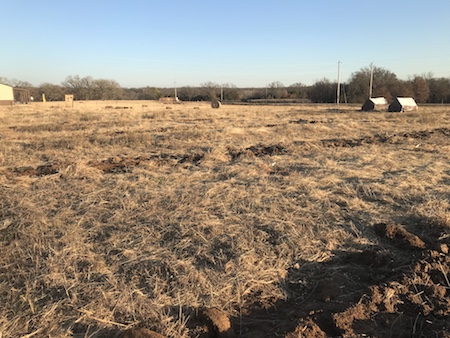 Canadian Valley Farms is an 80-acre family farm in Lexington, OK that produces heirloom, chemical-free vegetables, as well as honey, and meat from heritage breed livestock. They used their $5,000 grant to plant an orchard of 250 disease-resistant, rare southern heirloom apple trees.
Canadian Valley Farms is an 80-acre family farm in Lexington, OK that produces heirloom, chemical-free vegetables, as well as honey, and meat from heritage breed livestock. They used their $5,000 grant to plant an orchard of 250 disease-resistant, rare southern heirloom apple trees.
“Although this project was just completed this fall and early winter, we’ve already inspired a lot of support from our community, as we’re the first farm within 200 miles to plant apple trees. This project will allow us to host many orchard-related events on our farm, while continuing to engage the public by using the farm as a place for our community to learn about local food systems.” —Andy Wooliver, owner
Cattail Organics
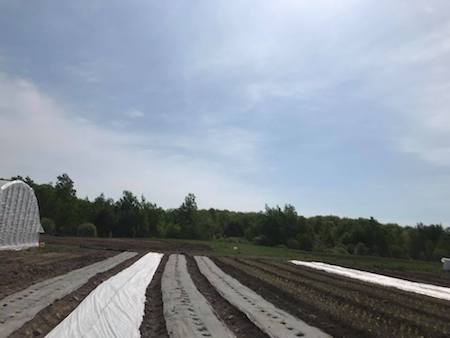 A small 5-acre farm in Athens, WI, Cattail Organics produces a variety of vegetables, cut flowers, herbs, and maple syrup that’s distributed directly to CSA members, restaurants, small groceries, and schools, with weekly donations to local food banks and shelters. They received a $5,000 grant to purchase equipment and seeds.
A small 5-acre farm in Athens, WI, Cattail Organics produces a variety of vegetables, cut flowers, herbs, and maple syrup that’s distributed directly to CSA members, restaurants, small groceries, and schools, with weekly donations to local food banks and shelters. They received a $5,000 grant to purchase equipment and seeds.
They purchased cover crop seeds, a seeder, a small-scale walk-behind cultivator, reusable landscape fabric, and floating row cover.
“Lower amounts of weeds and lower input costs associated with reduced tractor use clearly increase the profitability of the farm. Yield with landscape fabric was higher or the same as a plastic system.” —Kat Becker, farmer
Christensen’s Farm
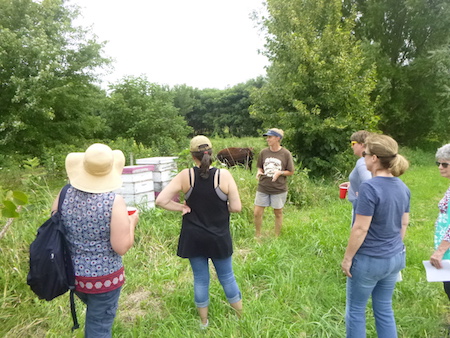 Christensen’s Farm is a 7-acre family farm in Browntown, WI. They keep bees and laying hens, and produce over 100 varieties of vegetables. They received a $1,463.50 grant to increase their number of beehives and add an observation hive for an educational curriculum.
Christensen’s Farm is a 7-acre family farm in Browntown, WI. They keep bees and laying hens, and produce over 100 varieties of vegetables. They received a $1,463.50 grant to increase their number of beehives and add an observation hive for an educational curriculum.
They were able to add seven hives, from which they harvested over 100lbs of honey in 2018. They also experienced some unexpected benefits.
“We had the most productive crops of sweet potatoes, winter squash, and pumpkins that we’ve ever had. They did benefit from the moisture, but both fields were in very close proximity to the bees, and I attribute much of their success to the prolific pollinators. This, in turn, allowed us to sell to a new restaurant, along with selling further into the fall and winter.” —Katy Dickson, owner
Doce Lume Farm
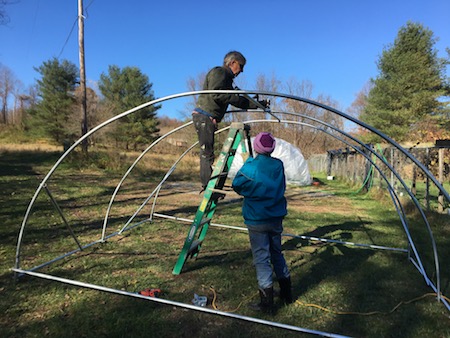 A 2-acre farm in Frederick, MD, Doce Lume Farm grows certified organic herbs and vegetables. They received a $1,735 grant to build hoop houses and establish a system to test the health of their soil.
A 2-acre farm in Frederick, MD, Doce Lume Farm grows certified organic herbs and vegetables. They received a $1,735 grant to build hoop houses and establish a system to test the health of their soil.
Despite experiencing flooding this season, they were able to construct four 10×13-foot hoop houses and begin growing greens, herbs and red onions in them. They also tested three batches of aerated compost. They hope that their easy-to-construct, small and mobile Damrosch Hoop Houses will be utilized as part of the Youth Gardening Committee public schools garden program they’re promoting with the University of Maryland Extension Master Gardeners.
“The generous support provided by The FruitGuys Community Fund allowed us to extend our growing season into cooler weather by building hoop houses and initiate a soil/compost/crop tissue–testing regimen to understand our soil health and ultimately our crop health.” —Janice Wiles, producer
Fly Girl Farm
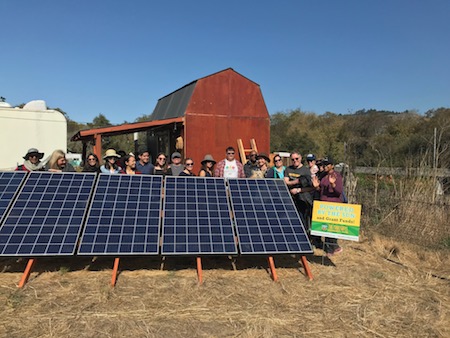 Fly Girl Farm is a women-run, 4-acre farm in Pescadero, CA, that gives young women the opportunity to experience running a farm. They grow vegetables, herbs, and cut flowers and received a $4,856 grant to purchase photovoltaic solar panels, a charge controller, a battery bank, and an inverter.
Fly Girl Farm is a women-run, 4-acre farm in Pescadero, CA, that gives young women the opportunity to experience running a farm. They grow vegetables, herbs, and cut flowers and received a $4,856 grant to purchase photovoltaic solar panels, a charge controller, a battery bank, and an inverter.
After experiencing some shipping problems, Fly Girl was able to install the new solar-powered system.
“We successfully completed the installation of a photovoltaic solar array, charge controller, battery bank, and inverter to power our small farm office and workshop space, as well as our intern housing. This off-grid energy system now meets the needs of our small and growing farm. We’re elated!” —Airielle Love and Kaeleigh Carrier, owners
Hope Mountain Farm
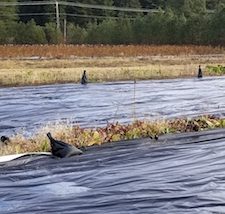 Hope Mountain Farm is a 4-acre farm in Leavenworth, WA, that grows certified organic berries and vegetables, in addition to keeping bees. They received a $5,000 grant to purchase silage tarps, ground cover, and a flail mower to mulch crops after harvest and create healthy soil.
Hope Mountain Farm is a 4-acre farm in Leavenworth, WA, that grows certified organic berries and vegetables, in addition to keeping bees. They received a $5,000 grant to purchase silage tarps, ground cover, and a flail mower to mulch crops after harvest and create healthy soil.
“We’ve completed all of our sustainability projects and fully transitioned to no-till production on our farm. We used silage tarps for proactive weed management throughout the season and also put them down in the fall to keep the ground drier for spring planting. Instead of tilling in our crops at the end of the season, we used the flail mower to create mulch and to prepare seed beds in between plantings.” —Susan Curtis, owner
Moon Dog Farms
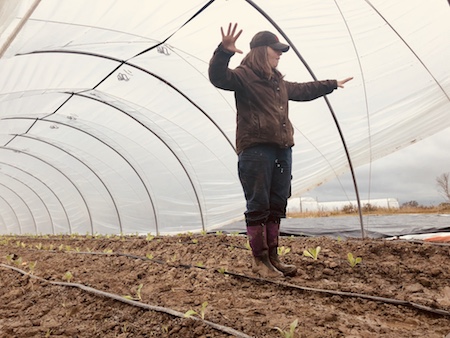 Moon Dog Farms, a 17-acre family farm in Santa Fe, TX, received a $5,000 grant to purchase three caterpillar tunnel kits, shade cloths, and a silage tarp. These tools helped them better cope with the region’s weather and make some big improvements.
Moon Dog Farms, a 17-acre family farm in Santa Fe, TX, received a $5,000 grant to purchase three caterpillar tunnel kits, shade cloths, and a silage tarp. These tools helped them better cope with the region’s weather and make some big improvements.
“We saw immediate benefits to our summer crops, in both yield and longevity. Cucumbers were harvested longer into our hottest months—a first!—and peppers and eggplants growing in the tunnels under shade were more robust than those growing outside of the tunnels. Additionally, while our summer staple veggies were faring better than usual, we were able to spend a bit more time concentrating on our summer flowers. This led to the best flower crops we’ve ever had at that time of year. Our summer revenue was the highest it’s ever been.” —Casey McAuliffe, co-owner
Namu Farm/Choi and Daughters Produce
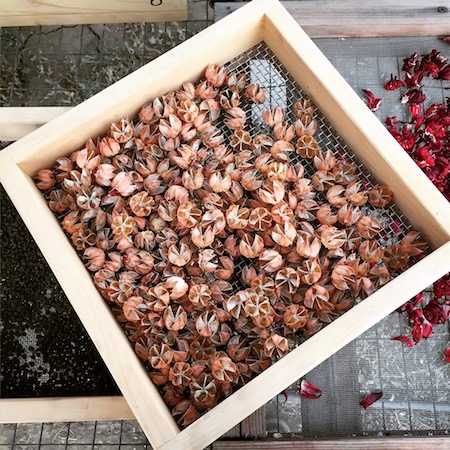 A 2-acre farm in Winters, CA, that focuses on East Asian vegetable and herb varieties, Namu Farm partners with Namu Gaji restaurant in San Francisco, distributes small veggie boxes to the local Korean community in the East Bay, and produces commercial seed for Kitazawa Seed Company. They received a $3,794.29 grant to purchase infrastructure for a hoop house, nursery benches, multiple-size screens, shade cloth, and tools for hand-processing seeds.
A 2-acre farm in Winters, CA, that focuses on East Asian vegetable and herb varieties, Namu Farm partners with Namu Gaji restaurant in San Francisco, distributes small veggie boxes to the local Korean community in the East Bay, and produces commercial seed for Kitazawa Seed Company. They received a $3,794.29 grant to purchase infrastructure for a hoop house, nursery benches, multiple-size screens, shade cloth, and tools for hand-processing seeds.
“The infrastructure support we acquired with our grant funding has provided us with exponential opportunities, including saving, processing, and cleaning several pounds of seed. Having the tools and physical space we need to harvest high-quality seed not only fosters resilience in our farming operation, it creates countless opportunities for all the communities we work with to deepen their work around ancestral foodways.” —Kristyn Leach, farmer
Refugee Empowerment Agricultural Program at Ohio City Farm
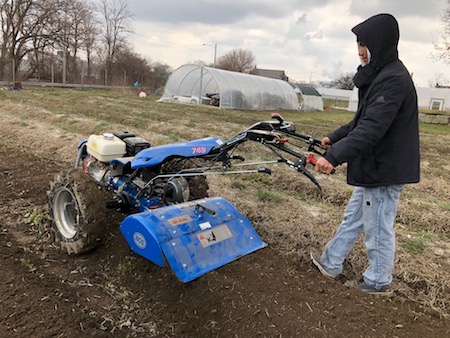 The Refugee Empowerment Agricultural Program (REAP), an initiative of Refugee Response, operates at the Ohio City Farm, which helps refugees in northeastern Ohio by providing them with employment, education, and training. They received a $2,780 grant to purchase two new walk-behind tractor attachments, a power harrower, and bed shaper. Unfortunately, Ohio City Farm didn’t receive their equipment in time for the beginning of the 2018 season—it will be utilized in 2019.
The Refugee Empowerment Agricultural Program (REAP), an initiative of Refugee Response, operates at the Ohio City Farm, which helps refugees in northeastern Ohio by providing them with employment, education, and training. They received a $2,780 grant to purchase two new walk-behind tractor attachments, a power harrower, and bed shaper. Unfortunately, Ohio City Farm didn’t receive their equipment in time for the beginning of the 2018 season—it will be utilized in 2019.
“The equipment procured through the generous support of The FruitGuys Community Fund will prove critical for our farm operations moving forward. It will drastically reduce the labor required to typically conduct these farm-based activities.” —Patrick Kearns, executive director, Refugee Response
Radical Roots Farm
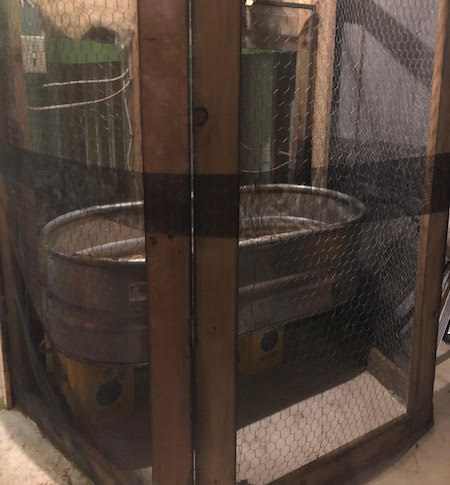 A 4-acre family farm in Canterbury, CT, Radical Roots Farm grows heirloom vegetables and fruits in addition to raising heritage livestock. They received a $4,500 grant to purchase 27 fruit and nut trees, as well as the tools, supplies, structures, and larvae to develop a composting system with black soldier flies. This system will help create high-protein feed for their livestock.
A 4-acre family farm in Canterbury, CT, Radical Roots Farm grows heirloom vegetables and fruits in addition to raising heritage livestock. They received a $4,500 grant to purchase 27 fruit and nut trees, as well as the tools, supplies, structures, and larvae to develop a composting system with black soldier flies. This system will help create high-protein feed for their livestock.
Radical Roots planted trees and purchased the black soldier fly larvae and set them up in their hoop house. They also secured a source of waste produce and meat from their local market to compost. Although they’ve faced some challenges with keeping their hoop house warm enough, they plan to purchase a wood stove for next winter.
“We appreciate the opportunity to take on this sustainability venture and hope to be able to continue it for years to come. We’ll definitely send frequent updates on different experiments we try with the black soldier flies such as overwintering the eggs/larvae.” —Alycia Salvas, partner
Root Mass Farm
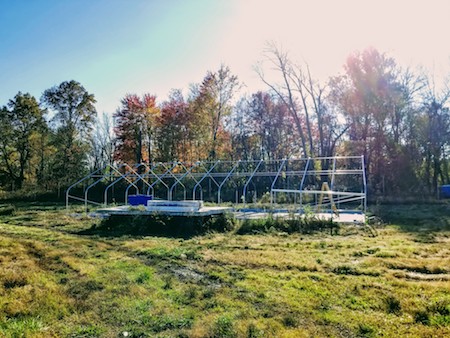 Root Mass Farm is a 5-acre farm in Oley, PA, that uses organic methods to produce vegetables, melons, perennial herbs, and berries. They received a $3,986 grant to build a 21×48-foot hoop house and plant fig trees.
Root Mass Farm is a 5-acre farm in Oley, PA, that uses organic methods to produce vegetables, melons, perennial herbs, and berries. They received a $3,986 grant to build a 21×48-foot hoop house and plant fig trees.
Despite a difficult season due to heavy rains that resulted in several crop failures, Root Mass Farm was able to construct their hoop house and get it planted with 21 fig trees.
“The fig tunnel has given us the opportunity to talk to our customers about organic fruit production and the challenges growers face in this region. The tunnel’s various components, like the insect netting and the ground cover, provide an entry point to discuss pests like the spotted lanternfly and the damaging impact of weed pressure.” —Lindsey Shapiro and Landon Jefferies, owners
The Roof Crop
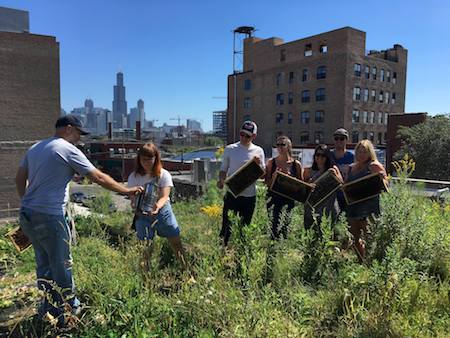 The Roof Crop is an urban farm in Chicago, IL, that produces edible flowers, vegetables, herbs, and apples. Their growing area now encompasses 30,000 square feet of rooftops. They received a $1,950 grant to purchase three beehives to add to their flagship farm.
The Roof Crop is an urban farm in Chicago, IL, that produces edible flowers, vegetables, herbs, and apples. Their growing area now encompasses 30,000 square feet of rooftops. They received a $1,950 grant to purchase three beehives to add to their flagship farm.
“The Roof Crop, along with the help of the Hive Supply beekeeping consultants, successfully installed, maintained, and harvested three beehives at our HQ location during the 2018 season. The best thing to come out of our initial beehive installation is the interest we’ve had from other building owners in adding beehives to their green roofs. This will add a significant increase in honey to our sales stream next year.” —Hannah Perron, operations and sales manager
Inspired by this year’s grantees? We’re already accepting letters of intent for the 2019 grant cycle. If you’re not a farmer but still want to get involved, consider donating or volunteering. Your help directly supports small farms and their communities.



